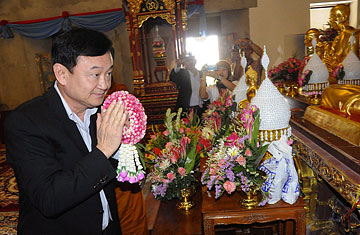
Former Thai Prime Minister Thaksin Shinawatra, who is currently living in exile, visits Wat Pa monastery in Bodh Gaya in India's Bihar state on Nov. 4, 2011
Thailand is on edge after news leaked this week that the government may pursue a royal pardon for Thaksin Shinawatra, the controversial former Prime Minister who was ousted in a military coup, convicted of corruption and fled the country rather than serve a two-year prison sentence. "This could cause a major confrontation," Panthep Pongpuapan, a spokesman for the anti-Thaksin People's Alliance for Democracy (PAD), told TIME on Thursday. Several months of street demonstrations by the PAD preceded the coup that deposed Thaksin in 2006. Opposition politicians lambasted the government over the issue in parliament on Thursday, as social-media websites exploded with contentious debates between Thaksin loyalists and critics.
Beginning in 2005, Thailand was plagued by a series of mass protests by groups opposing and supporting Thaksin. Now based in Dubai, Thaksin remains a godlike figure to the rural poor for his populist programs that sought to narrow disparities in income and is the darling of certain business cliques that did well under his rule. He has also drawn support from some groups that are opposed to Thailand's constitutional monarchy. Thaksin is loathed by the urban middle class, business cliques that were out of favor, elements of the military and royalists who regarded Thaksin as corrupt, authoritarian and disrespectful to the monarchy — an institution many Thais revere. The increasingly violent demonstrations by the PAD (also known as the Yellow Shirts) and the pro-Thaksin United Front for Democracy Against Dictatorship (also known as the Red Shirts) turned a country once regarded as an oasis of stability into a turbulent political cauldron, reeling from one crisis to the next. The civil strife came to a head in April and May 2010 when 91 people — mostly Red Shirts — were killed, and parts of Bangkok and other cities burned as the military cleared Thaksin loyalists who had occupied the capital's central business district.
A truce of sorts was reached in July of this year when elections ushered in a coalition government led by Yingluck Shinawatra, a younger sister of Thaksin who had never before held political office. Thaksin opponents accepted the result with the caveat that the new government not try to change laws to exonerate Thaksin or make other moves resulting in his return.
Yingluck's government has refused all comment on the pardon proposal. Constitutional monarch King Bhumibol Adulyadej must ultimately approve any decision. The King, who has been hospitalized since September 2009, turns 84 on Dec. 5, and customarily pardons thousands of prisoners on his birthday based on recommendations from the government and his advisers. But Thaksin is not a prisoner, having fled the country. Other conditions that traditionally must be met to receive a royal pardon are that the prisoner has acknowledged wrongdoing and not been convicted of either corruption or drug-related offenses. Thaksin would not appear to qualify under those terms.
The monarch is regarded as being above politics in Thailand, but the political conflicts of recent years have often been portrayed as a battle between Thaksin loyalists and royalists. If the pardon reaches the palace "it will put pressure on the King," Panthep said, drawing him into making a political decision. If the King refuses, or if his Privy Council chooses not to forward Thaksin's name for consideration, that could bring out Red Shirt protesters. "If they come out, so will we and other anti-Thaksin groups, and we will end up confronting each other," Panthep said. He added that the PAD was meeting to decide what course of action to take, including the possibility of renewed street protests.
An amnesty for Thaksin was raised Tuesday at the weekly Cabinet meeting. The Cabinet decided to expand the groups eligible for a pardon to include those over 60 years old whose sentence is for less than three years with no requirement of having served any time in prison. Critics have said this new category was designed specifically to include Thaksin, who boasted upon his sister's election in July that he would never serve a day in jail and would be back home in Thailand by December.
The government did not include any news of the change in pardon rules in its regular press release summarizing Cabinet proceedings, and local newspapers reported that government officials below the rank of minister were asked to leave the meeting before the issue was discussed. Prime Minister Yingluck did not attend the Cabinet meeting, claiming she could not return to Bangkok in time from visiting flood victims up-country because her helicopter was not equipped with radar and so could not fly at night. The military later said the helicopter is equipped with radar. News of the decision was leaked by a minister who attended the meeting, according to several local newspapers.
Thailand has been battling its worst floods in half a century and Yingluck's government has been strongly criticized for its uncoordinated response to the crisis. Senator Rosana Tositrakul of Bangkok, who defended Yingluck against calls for her resignation, said it was galling that the pardon was raised while the country is in the midst of a crisis. "People haven't gotten any assistance with the flood problems from this government. The one who's reaping the most benefit is the brother of the Prime Minister," she said.
